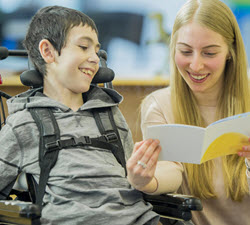Curriculum and support services
A personalised approach to learning and support takes into account all of the students’ individual needs and all of the adjustments they need to access and participate in their education. This planning might include what and where students learn, as well as their communication, mobility, behaviour and health care.
The Disability Standards for Education 2005 This link will open in a new window (the Standards) set out how education providers can work with students and their parents, guardians and carers to ensure that students with disability have the same choices and opportunities as other students when it comes to curriculum and accessing support services.
Curriculum
All students have the right to access the curriculum.
The ‘curriculum’ is what schools teach. The Standards apply to all areas of the curriculum.
Students with disability have the right to access the curriculum on the same basis as other students. This includes the right to be assessed fairly on what they have learnt.
Education providers who uphold these rights will provide an accessible and inclusive curriculum by:
- considering the needs of students with disability when they are designing curriculum and assessment tasks
- providing learning opportunities that meet students' individual needs
- providing students with extra support if necessary to enable them to participate and demonstrate their learning on the same basis as other students.
Consultation is an important part of this process. During consultation, the student or their parent, guardian or carer can discuss with the education provider whether the student's disability affects their access to the curriculum and, if so, what adjustments may be required.
Curriculum: In practice
Some of the ways schools comply with the Standards in regard to curriculum are by:
- making the curriculum, teaching materials, assessment tasks and certification accessible for a student with disability
- designing learning activities that are responsive to a student’s learning needs and focus on the student’s interests
- making learning materials available when they are needed and in a format that is appropriate; for example, providing a braille translation of a work task to a student with low vision, at the same time that other students receive their work tasks
- adjusting teaching methods, such as making more use of slide show presentations than of spoken presentations to enable a Deaf student to access the curriculum
- providing extra courses or programs to target gaps in the student’s learning; for example, extra lessons in reading and writing braille to a blind student so that they can develop literacy skills
- designing all learning activities inside or outside the classroom to include the student, such as hiring a wheelchair-accessible bus so that a student who uses a wheelchair can travel on an excursion with the whole class.
Support services
Students with disability have the right to general and specialised support.
Students with disability have the right to access support services, such as:
- general educational support services provided for all students, such as a computer helpdesk, a supervised homework club, or careers advisory service
- specialised support services for students with disability, such as physical therapy, or personal and medical care, which are essential for them to participate in education.
Education providers who uphold these rights will:
- take reasonable steps to ensure the student can access general support services and any specialised support services necessary for their education
- make an adjustment by offering support services that might involve people from within or outside the school
- ask the student or their associate if their disability affects their ability to access general or specialised support services
- make any necessary reasonable adjustments so the student has the same choices and opportunities to use support services as students without disability.
Through consultation, education providers are assisted in identifying and accessing services to support students with disability.
Support services: In practice
Some ways schools comply with the Standards for support services include:
- consulting with students or parents, guardians or carers about which general and specialised support services are available and how to use them
- providing specialised equipment to support learning and communicating, such as text-to-speech software, and speech-generating devices
- drawing on support staff such as specialist teachers, interpreters, and note-takers when necessary for student learning
- communicating with specialist services and expertise outside the school or education system – such as speech pathology, psychology, physiotherapy, occupational therapy and social work – to put in place collaborative arrangements for support.
A personalised approach to learning and support for a student with disability can enrich learning. Consultation with students or their parents, guardians or carers helps educators understand the student’s learning and support needs. Strategies and adjustments that meet the student’s needs can then be included in a plan. Although they are not required by the Standards, such plans can be useful for ongoing consultation about the student’s participation and learning.
National Disability Insurance Scheme
The National Disability Insurance Scheme (NDIS) is available to people who have significant disability that impacts on their capacity to participate socially and economically. It is available to that subset of students with disability who meet its eligibility criteria. Nationally, it is expected that about 10 per cent of people with disability, as defined by the Disability Discrimination Act 1992 (DDA), will be eligible for the NDIS.
The NDIS does not change the obligations of schools under the DDA to meet the reasonable adjustment needs of all students with disability. Parents of children who are NDIS participants are not required to share information about their child’s NDIS plan with the school.
The National Disability Insurance Agency (NDIA) provides funding to participants through an individual support plan for reasonable and necessary supports. Participants (or their parents, guardians or carers) then have choice and control over how those supports are arranged and who delivers them.
Supports that the NDIS may fund include:
- equipment or assistive technology, such as a communication device, wheelchair or hearing aid, that a person might need in any setting
- allied health services to support functioning such as occupational therapy or speech pathology
- personal care supports in the home or in the community
- supporting engagement with employment services
Related resources
- mail Email
-
BookmarkThis bookmark has been added to your bookmarks.Did you know you can organise your bookmarks into separate lists when you are signed in? Sign in or register

